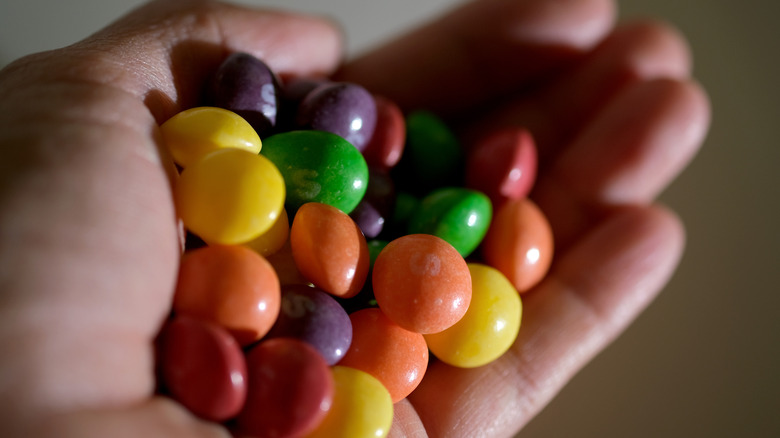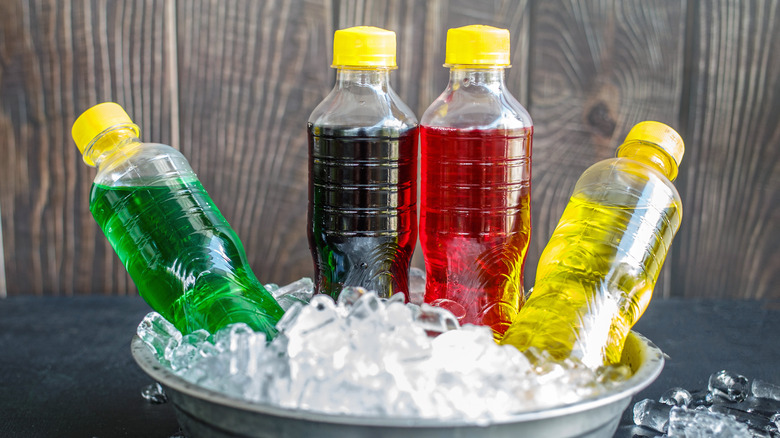Is California Really Banning Skittles Due To Health Concerns?
Bulk candy distributor Candy Store has been keeping tabs on America's sweet tooth for the last 15 years. 2023 research data released by the company revealed that Skittles ranks among the top five most popular Halloween candies nationwide. Most recently, however, Skittles fans have questioned whether the rainbow candies may soon be removed from movie theater snack stands and gas station shelves in the state of California due to the recent passing of what the public has nicknamed the "Skittles ban" bill (via Today).
Despite the catchy name, Skittles was never the subject of the bill, the official name of which is Assembly Bill (AB) 418. Rather, the proposed legislation was in regards to the banning of certain potentially harmful food additives found in many commercial candy products. When the bill was first approved by the Assembly earlier this year, titanium dioxide (which can be found in Skittles) was among the five additives included in the bill. Since then, however, titanium dioxide has been removed from the bill that was just passed by the California State Senate, marking Skittles safe from the ban. The bill will be enforced starting in January 2027.
What is titanium dioxide?
Titanium dioxide is a chemical ingredient that can be used to make food items white and shiny in color, such as icing, gum, and coffee creamer, according to 2021 research published in the International Journal of Molecular Sciences. It is also used in the creation of toothpaste, medications, paint, and makeup products, among other items. The ingredient has been linked to potential health issues from long-term respiratory exposure, as seen in longitudinal rat studies where the animals subsequently developed lung tumors after inhaling high levels of titanium dioxide.
As a food additive, however, titanium dioxide has been deemed safe in small amounts by the U.S. Food and Drug Administration (FDA). Use of the chemical is greatly restricted, with no more than 1% titanium dioxide allowed in food items, reports WebMD. However, the additive has been banned in other countries due to concerns regarding its potential carcinogenic properties. In fact, consumers have sued the makers of Skittles for their use of titanium dioxide. In response, the company has stated that their manufacturing of the candy fully adheres to all FDA regulations (via NPR). Although the company has issued prior statements voicing plans to gradually eliminate the use of titanium dioxide in Skittles, they have yet to do so (per Health News).
California is banning red dye No. 3 and propylparaben
Although titanium dioxide is no longer included in the bill, red dye No. 3 still is. Found in numerous food items from popsicles to hard candy, cookies, frosting, ice cream cones, and even meal replacement bars, red dye No. 3 has been banned in other parts of the world as a food additive (via Prevention). While the U.S. has banned the chemical from use in makeup products, it is still allowed in our food. The main health concerns around ingesting red dye No. 3 are that it has been tied to behavioral problems in young kids as well as thyroid cancer in animal studies.
Propylparaben is also on its way out in the state of California. This additive, used in many baked goods to keep them fresh for longer periods of time, may negatively impact hormone function and reproductive health, as seen in animal research (via Consumer Reports).
California is banning brominated vegetable oil and potassium bromate
Brominated vegetable oil (BVO) will also be banned in California come 2027. Often used in citrus-flavored beverages, it is regulated by the FDA and is limited to 15 parts per million as a food additive. While more study is still needed, animal research has suggested that BVO may negatively impact heart and thyroid health. Consumer Reports adds that BVO may also pose risks to one's reproductive, neurological, and developmental health. The fourth and final food additive included in AB418 is potassium bromate, which may potentially harbor carcinogenic properties.
Jesse Gabriel, a California Democratic Assembly member, told Today that the goal is not to do away with Americans' favorite snacks, but to make them safer for public consumption. "The idea here is for these companies to make minor modifications to their recipes so that these products don't include dangerous and toxic chemicals," he told the outlet, noting that Skittles and other popular candies have successfully undergone recipe changes in other parts of the world already. Rather, experts say that alternatives such as sorbic acid, ester gum, or calcium carbonate can often be more affordable for manufacturers while still offering consumers the same great flavor they've come to know and love.




